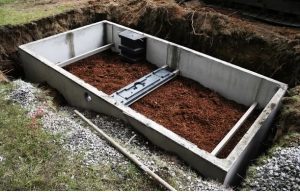 In general, a professionally installed septic system can last up to 30 years. Several factors can have an impact on that longevity. First of all, septic systems that endure a long time are those that were constructed correctly and are adequately maintained.
In general, a professionally installed septic system can last up to 30 years. Several factors can have an impact on that longevity. First of all, septic systems that endure a long time are those that were constructed correctly and are adequately maintained.
In addition to installation, the following elements will significantly affect its lifespan:
People Per Household
The number of persons that each bedroom produces is roughly 500L of water per day on average. This means that your septic system will need to be able to handle more wastewater depending on the more bedrooms you have. The wastewater may be driven into the drain field if the septic tank receives too much water at once, which could happen before the bacteria have finished decomposing the organic waste or before the remaining particles have had time to settle. These substances may cause the system to fail early if they get into the drain field.
This is why it is crucial to use Septifix to clean your septic tank and pipes.
Click Here To Keep Your Septic Tank and Its Pipes Fresh and Clean!
The Items You Use
A lot of common cleaning supplies contain chemicals that might be harmful to the bacteria required for a healthy septic system. The septic system is impacted every time a homeowner utilizes these toxic goods.
Soil
The quality of the soil will impact how long your septic tank will last. A concrete septic tank can deteriorate more quickly in highly acidic groundwater. To choose the optimum septic system to install, a skilled septic designer and specialist should assess your land.
The average lifespan of septic systems in Canada is 20 to 30 years. Depending on the soil characteristics and how well the owner maintains it, your septic system may live up to 50 years or longer.
How Long Does a Drain Field Last
At least 20 years should pass after a drain field has been constructed and maintained properly. The lifespan of the septic drain field is, however, dependent on a few different elements. As follows:
Its longevity, the depth of the water table, the size of the leach field, and even the type of gravel used will all depend on the specifics of how the leach field was placed.
Effluent Discharge System
The drain field’s lifespan is dependent on how the septic system discharges its effluent. Some discharge techniques could overburden the drain field with wastewater, which would slow the percolation rate.
Soil Conditions
If the rate of percolation in the drain field region is not very good, it will not last long. Soil conditions have an impact on this rate. Seasonal flooding, surface runoff, and groundwater levels are further significant aspects of soil conditions.
Maintenance
A septic drain field that receives regular maintenance outlives one that doesn’t. Cleaning out your septic tank regularly is part of maintenance, as is taking extra efforts to add beneficial microorganisms to your system by using Septifix.
What Causes Septic Systems To Fail
The wastewater that is released from your home is kept in the septic tank. The liquid wastewater separates from the solid organic waste in the tank. While grease rises to the top of the tank to generate the scum layer, solid particles sink at the bottom to form sludge. Some sediments escape with the wastewater as effluent flows from the tank into the drain field; over time, these solids clog the leach field. The anaerobic bacteria’s protective mucus coating will also leak into the leaching field, resulting in the formation of a bio-mat.
Backups, odors, and a revolting, foul-smelling lawn result from a blocked leach field’s inability to handle wastewater.



